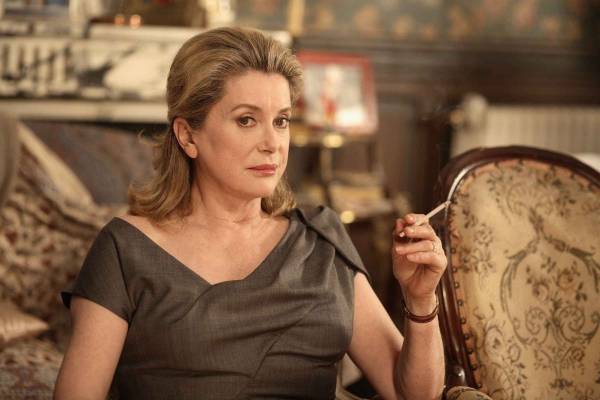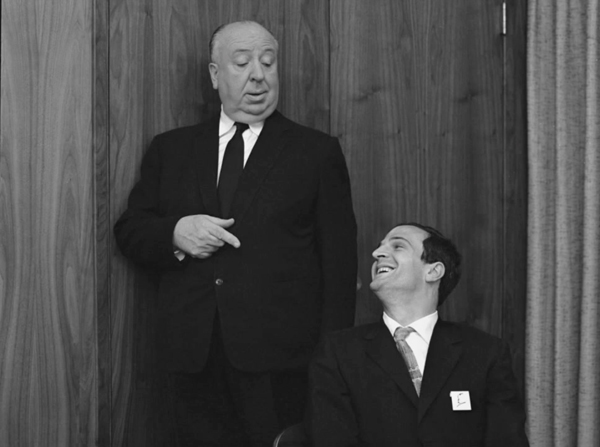
Documentary examines the extraordinary interview sessions between François Truffaut and Alfred Hitchcock (photo by Philippe Halsman)
HITCHCOCK/TRUFFAUT (Kent Jones, 2015)
Film Forum
209 West Houston St.
December 2-17
212-727-8110
filmforum.org
cohenmedia.net/films
 “In 1962, while in New York to present Jules and Jim, I noticed that every journalist asked me the same question: ‘Why do the critics of Cahiers du Cinéma take Hitchcock so seriously? He’s rich and successful, but his movies have no substance,’” French Nouvelle Vague auteur François Truffaut wrote in the preface to the second edition of what he called “the hitchbook,” the seminal film bible Truffaut/Hitchcock. “In the course of an interview during which I praised Rear Window to the skies, an American critic surprised me by commenting, ‘You love Rear Window because, as a stranger to New York, you know nothing about Greenwich Village.’ To this absurd statement, I replied, ‘Rear Window is not about Greenwich Village, it is a film about cinema, and I do know cinema.’” Truffaut was determined to change the prevailing belief that British director Alfred Hitchcock was a maker of studio fluff. “In examining his films,” Truffaut continued, “it was obvious that he had given more thought to the potential of his art than any of his colleagues. It occurred to me that if he would, for the first time, agree to respond seriously to a systematic questionnaire, the resulting document might modify the American critics’ approach to Hitchcock. That is what this book is all about.” The tome compiled a weeklong series of conversations between the thirty-year-old Truffaut and the sixty-three-year-old Hitchcock — the talks began on Hitch’s birthday — in the latter’s Hollywood studio office, with Helen Scott serving as translator. Although the interviews were recorded for audio, no film was shot; instead, Philippe Halsman took still photos. The story of the unique relationship between Truffaut, who as of 1962 had made only The 400 Blows and Shoot the Piano Player (he was in the midst of finalizing Jules and Jim), and Hitchcock, who was preparing his forty-eighth film, The Birds, is told in the splendid documentary Hitchcock/Truffaut, which cleverly reverses the order of their names from the book it’s based on. Writer-director Kent Jones (head of the New York Film Festival), cowriter Serge Toubiana (former editor in chief of Cahiers du Cinéma) and editor Rachel Reichman lovingly combine Halsman’s pictures, audio clips from the original sessions, scenes from many of Hitchcock’s films (and a few of Truffaut’s), close-ups of dozens of pages from the book, rare archival footage, and new interviews with ten directors from around the world who weigh in on what makes Hitchcock’s work so special, so illuminating, so influential.
“In 1962, while in New York to present Jules and Jim, I noticed that every journalist asked me the same question: ‘Why do the critics of Cahiers du Cinéma take Hitchcock so seriously? He’s rich and successful, but his movies have no substance,’” French Nouvelle Vague auteur François Truffaut wrote in the preface to the second edition of what he called “the hitchbook,” the seminal film bible Truffaut/Hitchcock. “In the course of an interview during which I praised Rear Window to the skies, an American critic surprised me by commenting, ‘You love Rear Window because, as a stranger to New York, you know nothing about Greenwich Village.’ To this absurd statement, I replied, ‘Rear Window is not about Greenwich Village, it is a film about cinema, and I do know cinema.’” Truffaut was determined to change the prevailing belief that British director Alfred Hitchcock was a maker of studio fluff. “In examining his films,” Truffaut continued, “it was obvious that he had given more thought to the potential of his art than any of his colleagues. It occurred to me that if he would, for the first time, agree to respond seriously to a systematic questionnaire, the resulting document might modify the American critics’ approach to Hitchcock. That is what this book is all about.” The tome compiled a weeklong series of conversations between the thirty-year-old Truffaut and the sixty-three-year-old Hitchcock — the talks began on Hitch’s birthday — in the latter’s Hollywood studio office, with Helen Scott serving as translator. Although the interviews were recorded for audio, no film was shot; instead, Philippe Halsman took still photos. The story of the unique relationship between Truffaut, who as of 1962 had made only The 400 Blows and Shoot the Piano Player (he was in the midst of finalizing Jules and Jim), and Hitchcock, who was preparing his forty-eighth film, The Birds, is told in the splendid documentary Hitchcock/Truffaut, which cleverly reverses the order of their names from the book it’s based on. Writer-director Kent Jones (head of the New York Film Festival), cowriter Serge Toubiana (former editor in chief of Cahiers du Cinéma) and editor Rachel Reichman lovingly combine Halsman’s pictures, audio clips from the original sessions, scenes from many of Hitchcock’s films (and a few of Truffaut’s), close-ups of dozens of pages from the book, rare archival footage, and new interviews with ten directors from around the world who weigh in on what makes Hitchcock’s work so special, so illuminating, so influential.
Sharing their praise are Martin Scorsese, Wes Anderson, David Fincher, Olivier Assayas, Peter Bogdanovich, Arnaud Desplechin, James Gray, Kiyoshi Kurosawa, Richard Linklater, and Paul Schrader, as they shed light on such classic films as Vertigo, Psycho, I Confess, The Wrong Man, Sabotage, Marnie, Rear Window, and others, with detailed shot-by-shot analysis while also praising the importance of “the hitchbook” itself. It all makes for an eye-opening crash course in cinema, and it’s likely to change the way you look and think about motion pictures. “It was a window into the world of cinema that I hadn’t had before, because it was a director simultaneously talking about his own work but doing so in a way that was utterly unpretentious and had no pomposity,” Gray (Little Odessa, Two Lovers) says about the book. “There was starting to be these kind of erudite conversations about the art form, but Truffaut was the first one where you really felt that they were talking about the craft of it,” Schrader (American Gigolo, Mishima) points out. “It’s not just that Truffaut wrote a book about Hitchcock. The book is an essential part of his body of work,” Olivier Assayas (Clouds of Sils Maria, Carlos) explains. “I think it conclusively changed people’s opinions about Hitchcock, and so Hitchcock began to be taken much more seriously,” Bogdanovich (The Last Picture Show, Paper Moon) asserts. And Scorsese (Taxi Driver, Raging Bull) sums up, “It was almost as if somebody had taken a weight off our shoulders and said yes, we can embrace this, we could go.” Of course, the book not only created a critical reassessment of Hitchcock but also helped Truffaut’s budding career. Narrated by Bob Balaban, the film places the work of the two men, who remained good friends until Hitchcock’s death in 1980 at the age of eighty (sadly, Truffaut died four years later at the age of fifty-two), in context of the history of cinema. “Why do these Hitchcock films stand up well? Well, I don’t know the answer,” Hitchcock is heard saying at the beginning of the documentary. By the end of the documentary, you will surely know the answer. Following its recent screening at DOC NYC with Jones and Scorsese present, Hitchcock/Truffaut will be playing at Film Forum December 2-17.
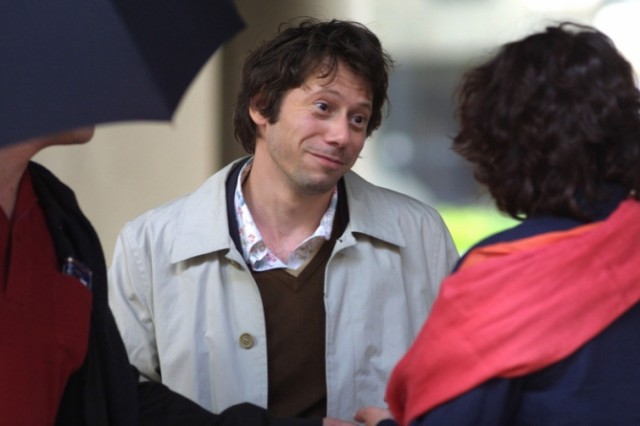
 Award-winning French actor-director Mathieu Amalric is celebrating his fiftieth birthday with an exciting invasion of New York City, where he is being honored in a pair of terrific companion film series and will also star in a theatrical production. FIAF’s CinéSalon tribute runs on Tuesday nights through December 15, beginning November 3 with a screening of his 2014 film
Award-winning French actor-director Mathieu Amalric is celebrating his fiftieth birthday with an exciting invasion of New York City, where he is being honored in a pair of terrific companion film series and will also star in a theatrical production. FIAF’s CinéSalon tribute runs on Tuesday nights through December 15, beginning November 3 with a screening of his 2014 film 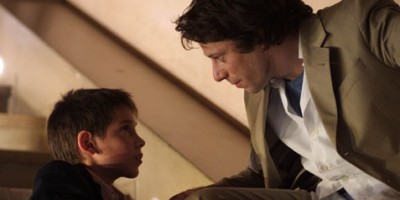
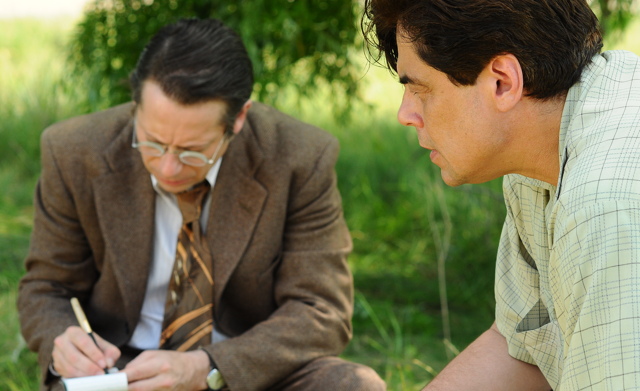
 Based on a true story documented in Georges Devereux’s 1951 book, Reality and Dream: Psychotherapy of a Plains Indian, which features an introduction by Margaret Mead, Palme d’Or nominee Jimmy P. details the fascinating relationship between French-Hungarian ethnologist, anthropologist, and psychoanalyst Devereux (Mathieu Amalric) and Native American Blackfoot James Picard (Benicio del Toro). A WWII veteran living in Montana in 1948, Picard is taken to Topeka Winter Hospital after suffering from debilitating headaches and temporary blindness. When doctors Menninger (Larry Pine), Holt (Joseph Cross), Braatoy (Ricky Wayne), and Jokl (Elya Baskin) can’t find anything physically wrong with Picard — and wonder whether their unfamiliarity with Indians is limiting their understanding of his problems — Menninger calls in his colleague Devereux, a Freudian who is having difficulty getting a full-time position because of some of the unusual methods he employs. An excited Devereux immerses himself in Picard’s case, getting the direct, not-very-talkative Blackfoot to soon start opening up about his personal life, share his dreams, and discuss his military experiences. While the other doctors disagree with one another on what Devereux is doing, he and Jimmy develop a unique friendship, two very different men trying to find their place in life. Director Arnaud Desplechin wrote the screenplay (with Julie Peyr and Kent Jones) specifically for Amalric and del Toro, and it’s a terrific pairing, the former, who has previously starred in Desplechin’s
Based on a true story documented in Georges Devereux’s 1951 book, Reality and Dream: Psychotherapy of a Plains Indian, which features an introduction by Margaret Mead, Palme d’Or nominee Jimmy P. details the fascinating relationship between French-Hungarian ethnologist, anthropologist, and psychoanalyst Devereux (Mathieu Amalric) and Native American Blackfoot James Picard (Benicio del Toro). A WWII veteran living in Montana in 1948, Picard is taken to Topeka Winter Hospital after suffering from debilitating headaches and temporary blindness. When doctors Menninger (Larry Pine), Holt (Joseph Cross), Braatoy (Ricky Wayne), and Jokl (Elya Baskin) can’t find anything physically wrong with Picard — and wonder whether their unfamiliarity with Indians is limiting their understanding of his problems — Menninger calls in his colleague Devereux, a Freudian who is having difficulty getting a full-time position because of some of the unusual methods he employs. An excited Devereux immerses himself in Picard’s case, getting the direct, not-very-talkative Blackfoot to soon start opening up about his personal life, share his dreams, and discuss his military experiences. While the other doctors disagree with one another on what Devereux is doing, he and Jimmy develop a unique friendship, two very different men trying to find their place in life. Director Arnaud Desplechin wrote the screenplay (with Julie Peyr and Kent Jones) specifically for Amalric and del Toro, and it’s a terrific pairing, the former, who has previously starred in Desplechin’s